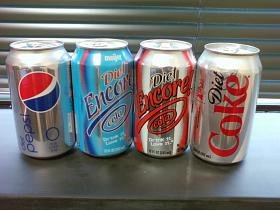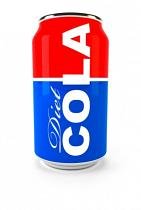Diet Colas: Artiticial sweetners cause weight gain and diabetes
(NaturalNews) -- Artificially sweetened drinks are often promoted as healthy alternatives for weight loss and diabetes because they are low in calories and don't contain sugar. However, there is plenty of evidence to suggest that these diet sodas are harmful to human health. According to Sharon Fowler, MPH, an authority on this subject, "Diet soda is not a health food. In fact, it's not a food at all, it's simply a slurry of chemicals, a number of which may have deleterious effects on the body." Most recently diet sodas have been tied to increased risk of stroke and heart attack, and while many people drink them as an aid to weight reduction, research suggests if you drink diet soda, weight gain may be the result instead. Weight gain In one study linking diet beverages to weight gain, Hazuda, et. al. at the University of Texas Health Science Center in San Antonio, recorded changes in waist circumferences in 474 elderly participants in a 10-year study. As part of the study they controlled for diabetes, physical activity, neighbourhood, age, sex and ethnicity. Findings showed that increases in waist sizes were 70 percent greater among those who drank diet soft drinks compared with those who did not. In addition, waist size increases were as much as 500 percent greater amongst those that drank two or more diet sodas a day. In other research, Sharon Fowler and colleagues studied eight years of data based on individuals between 25 and 64. Of the study participants who were of normal weight in the beginning, a third were overweight or obese eight years later. In evaluating the correlation between obesity and diet drinks researchers found that every bottle of diet soda participants drank in a day raised their obesity risk by 41 percent. Diabetes Aspartame, a common sweetener in diet beverages, has also been linked to diabetes. In an animal study conducted at UT San Antonio, researchers fed corn oil-enriched feed to one group of mice and the same feed plus aspartame to another group. Three months later the aspartame group had elevated glucose levels but insulin levels that were equal to or less than those of the control group, suggesting that aspartame may be part of the connection between diet soda consumption and diabetes.
Comments
There are 0 comments on this post
















